|
|
|
Sort Order |
|
|
|
Items / Page
|
|
|
|
|
|
|
| Srl | Item |
| 1 |
ID:
193143
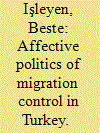

|
|
|
|
|
| Summary/Abstract |
There is an increasing call for addressing the Eurocentrism of research on the external dimension of European Union (EU) migration and border policies and practices. A growing body of work attempts to remedy the discipline’s Eurocentrism through postcolonial theory. This article argues that more needs to be done to unsettle the Eurocentrism of migration studies with regard to the question of non-EU political subjectivity. The article adopts an alternative conception of subjectivity, which looks at the “affective” dimension of international relations. Through a close engagement with postcolonial studies on the question of political subjectivity, the article underscores the significance of history and historical relationships in constituting an affective politics of borders and migration in the non-EU world. The argument is illustrated through an empirical focus on Turkey. Drawing on interviews with Turkish border officials, the article aims to contribute to the literature in two ways. First, it argues that affective attachments shape how Turkish actors perceive and attribute meaning to national borders and human mobility across the national territory. Second, and relatedly, Turkish actors’ identification with and positioning towards the EU’s migration control regime are products of affective attachments rooted in historical experiences and encounters with Europe.
|
|
|
|
|
|
|
|
|
|
|
|
|
|
|
|
| 2 |
ID:
193150
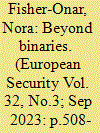

|
|
|
|
|
| Summary/Abstract |
This conclusion to the special issue notes the persistent use of binary frames in conceptions of (European) security. Such frames reify and limit our ability to make sense of key security challenges, not least by occluding their gendered and racialised dimensions. Therefore, it asks: How to move beyond binaries towards a more nuanced, inclusive and impactful conception of (European) security? Developing an answer via synthetic engagement of the articles in this collection – and their sources in gender and postcolonial studies – it argues that we can begin to challenge binaries with a relational approach operationalised by linking three concepts: intersectional positionality, performativity and allyship. By thus acknowledging the plural and performative thrust of intersecting security stances, the pieces in this collection point to the promise of situationally appropriate forms of allyship across positions, bringing a broader range of voices and insights to security agendas.
|
|
|
|
|
|
|
|
|
|
|
|
|
|
|
|
| 3 |
ID:
193149
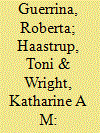

|
|
|
|
|
| Summary/Abstract |
Since 2014, several European Union (EU) member states have adopted their own versions of “Feminist Foreign Policy” (FFP). Increasingly, feminist bureaucrats, politicians, activists and scholars are calling for the EU to do the same. This article scrutinises claims to the feminist actorsness of the EU by introducing the analytical concept of Feminist Power Europe (FPE). In employing FPE the article examines whether the EU can adopt a FFP that upholds transformative potential of feminism. Undertaking critical content analysis of key documents, we identify three overarching feminist frames that emerge in the EU’s external policies: (1) Liberal; (2) Intersectional; (3) Postcolonial. We demonstrate that the EU’s propensity for a transformative feminist foreign policy is limited by the setup of global politics and the main drivers of European integration, which continue to be situated in a traditionally masculine environment and are defined by prevailing hierarchies. In undertaking this work, we highlight the constraints of advocating for the EU to adopt a FFP. This paper concludes by cautioning against the uncritical deployment of “feminism” in foreign policy articulation within an FPE configuration that excludes reflexivity about the EU’s external relations vision and indeed, its practice.
|
|
|
|
|
|
|
|
|
|
|
|
|
|
|
|
| 4 |
ID:
193147
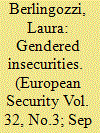

|
|
|
|
|
| Summary/Abstract |
What kind and whose security is the European Union concerned with in its gender practices in countering violent extremism? This article contributes to the scholarship on EU implementation of the Women, Peace and Security agenda and gender in countering violent extremism, highlighting shortcomings in the conceptualisation and practice of women’s participation in the security sphere. Taking Niger as a heuristic case study, the paper explores tensions between local gender norms and EU securitised framing of women’s empowerment and gender equality, arguing that women’s increased participation in the security field is tacitly understood in terms of use-value. Building on feminist postcolonial scholarship, the analysis uncovers how women are included and what expectations they are deriving from their engagement, exposing the neoliberal and neocolonial framings of EU intervention and the misunderstandings of women’s materialities. By ontologically flattening women subjectivities without accounting for their intersectional experiences, both patriarchy and global hierarchies of knowledge production are reiterated. In doing so, the EU co-constructs gendered and racialised subjects, thus reinforcing inequalities, silencing local pluralities, and in many cases, aggravating women’s situation of insecurity in Niger. The analysis employs feminist and ethnographic methods, including semi-structured interviews and participant observation.
|
|
|
|
|
|
|
|
|
|
|
|
|
|
|
|
| 5 |
ID:
193145
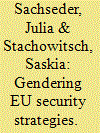

|
|
|
|
|
| Summary/Abstract |
This paper explores the relationship between the EU’s current re-imagining as a global security actor and its stance as a global promoter of progressive gender norms. For this purpose, we analyse how gender and race are constitutive of the meanings of security and Europe in major EU security strategies, and how this relates to the way gender (equality) is addressed as a policy issue. We find that, in the context of waning liberal world order and manifold internal and external crises, EU security actorness is constructed through narratives of masculinisation that entail feminisation of the EU’s own past as a “peace project” and “soft power”; Othering of non-EU spaces and subjects; colonial perspectives on the EU’s role in the world as “White Man’s burden” and the reconstruction of whiteness through notions of “neutral” masculinities associated with technocratic professionalism, superior knowledge production, and market rationality. This intersectional gendering of EU security limits the emancipatory potential of gender policy through the racialisation of Other women and the simultaneous invisibilisation of postcolonial structures of inequality. Our analysis provides the groundwork for addressing how and why the EUropean security project continues to reproduce intersectional power relations and insecurities, despite commitments to gender equality and non-discrimination.
|
|
|
|
|
|
|
|
|
|
|
|
|
|
|
|
| 6 |
ID:
193146
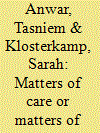

|
|
|
|
|
| Summary/Abstract |
International treaties and European directives have put new legal responsibilities on EU member states to pre-emptively monitor and prosecute terrorist activities and offences. In particular, the prosecution of terrorism financing has been an important focus to prevent material and ideological support for terrorist organisations. Yet, a clear distinction between humanitarian aid and terrorism financing in a complex war zone is not always easy to draw: Which of the involved parties is perceived as a terrorist threat, and what is exactly considered humanitarian aid work? In this paper, we empirically unpack how EU counter-terrorism laws and policies are actually practiced during court trials. We investigate the legal distinction between humanitarian aid and terrorism financing in Syria, specifically centring on trials from the Netherlands and Germany. Drawing on the growing debates in critical security and legal studies on materiality, we focus on how materials presented during trials such as baby products, weapons, and money, are inscribed with a particular security logic to reach a legal verdict. Introducing the concept of “matters of care/security”, we connect these debates and findings to insights from feminist and post-colonial studies to critically inquire how racialised and gendered assumptions on terrorist threat impact terrorism trials.
|
|
|
|
|
|
|
|
|
|
|
|
|
|
|
|
| 7 |
ID:
193148
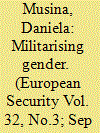

|
|
|
|
|
| Summary/Abstract |
This article seeks to advance a contrapuntal reading of experiences and practices of Women, Peace and Security (WPS) applications in Tunisia. Drawing from Edward Said, a “contrapuntal reading” encourages to look at multiple perspectives and experiences, beyond dominant ones, to achieve a better understanding of the way WPS applications intersect with contextual and power dynamics. By focusing specifically on European-Tunisian security assemblages and their WPS discursive-practical articulations foregrounded in ‘capacity-building' and training sessions, the article argues that processes of militarization emerge distinctively from these assemblages and are linked to a muscular neoliberal security order that produces gendered divisions of labour, instrumentalizes (wo)men's roles and keeps them subjugated to masculine military requirements. Accounts emerging from in-depth interviews and participant observation are emblematic of the propensity to locate the genesis of gender-based discrimination and violence in the Tunisian context (and more extensively in the Global South), while discharging the conditions of reproduction of that violence favoured by policies of external intervention, including WPS ones, and by the militarization of social relations. This legitimizes and normalizes in turn the need for external intervention and training, undermines real gender transformative change and benefits versions of “state feminism” and its transnationally well-positioned Tunisian elites.
|
|
|
|
|
|
|
|
|
|
|
|
|
|
|
|
| 8 |
ID:
193144


|
|
|
|
|
| Summary/Abstract |
In this article, we examine the Hungarian and Turkish responses to the EU’s handling of the 2015 refugee “crisis” through a postcolonial feminist IR framework. Drawing on hypermasculinity, we argue that both countries utilise migration to overcome their postcolonial and masculine anxieties by confronting their positions within the international hierarchies. Our examination of policy statements and speeches by Viktor Orbán and Recep Tayyip Erdoğan between 2015 and 2016 reveals three masculinised responses. First, both leaders portray themselves as acting out of paternal authority, while painting the EU as weak or inhumane. Second, they depict the EU as incompetent and their countries as competent providers of security. Third, they present themselves as protectors of European values, and the EU as in need of protection. These rhetorics suggest that both leaders used the “crisis” to challenge the current international hierarchy. Despite this, we argue that they are only concerned with their countries’ rankings within the hierarchy, not the system itself. Our postcolonial feminist reading of the “crisis” reveals that these masculinised framings are in fact counterproductive and only serve to confirm both Hungary and Turkey’s positions at the bottom of the international hierarchies, and their subordination to the EU as the EU’s others.
|
|
|
|
|
|
|
|
|
|
|
|
|
|
|
|
| 9 |
ID:
193142


|
|
|
|
|
| Summary/Abstract |
Russia's full-scale war against Ukraine represents a critical juncture for the role gender plays in European security. We argue that the Russian invasion of Ukraine is not only gendered in the way other conflict are, but the war's essential novelty lies in the fact that it is explicitly fought for the so-called traditional values, against gender and sexual equalities. Drawing on local decolonial insights and theoretical concepts of liberal/illiberal gender orders, we contrast the Russian neo-traditionalism with the Ukrainian account of the Russian invasion, while seeking to uncover how an imagination of Europe is constitutive for these gendered discourses. We show that the construction of the narratives is a circular process of ever more pronounced neo-traditionalism by Russia which sees Europe as its decadent Other. We demonstrate that these discourses have real consequences as the Russian illiberal gender order justifies and wages real war against Ukraine and gender is turning into the central battlefield both in the figurative and the literal sense of the word. Russian accounts contrast with Ukraine's hybridised, but increasingly emancipatory discourses and practices which have been playing a fundamental role in Ukraine's resistance to the Russian invasion.
|
|
|
|
|
|
|
|
|
|
|
|
|
|
|
|
| 10 |
ID:
193141
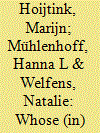

|
|
|
|
|
| Summary/Abstract |
Building on feminist and postcolonial theoretical approaches across International Relations (IR) and security studies, this Special Issue advances an emerging research agenda within EU studies by shedding light on the gendered and racialised logics of EU security and their links to colonial histories and practices. Together, the contributions to this Special Issue demonstrate how EU security is intrinsically connected to and constituted by histories of colonialism, racism and patriarchy. At the same time, they also highlight how the colonial, racialised and gendered dynamics that underpin EU security and that are mobilised by the EU, its institutions and member states are always complex and shifting. Importantly, they do so by decentring our analysis of EU security moving our focus often away from the EU and towards different, somewhat unexpected sites and geographical locations of EU security. The current war in Ukraine underwrites the need for more historical, contextual and decentred work on EU security, while also highlighting the necessity to reflect on dominant practices of knowledge production and the experiences of people living in and with war through a feminist and postcolonial lens.
|
|
|
|
|
|
|
|
|
|
|
|
|
|
|
|
|
|
|
|
|